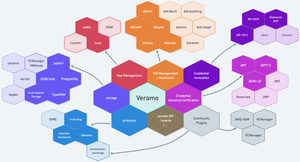DIF is honoured to host the China Academy of Information and Communications Technology (CAICT), one of China’s leading scientific research institutes, founded in 1957, as the founding member of the DIF China Special Interest Group (SIG).
Decentralized technologies are being actively developed in China, with more than 300 blockchain projects launched across the country in 2022, covering multiple industries and fields.
The Special Interest Group will be chaired by Xie Jiagui, Chief Engineer at CAICT’s Institute for Industrial Internet & Internet of Things (pictured above), who is engaged in research and development of network identification, blockchain technology systems, and big data technology.
We asked Mr Xie and Chiye Sun, Global Partnership Manager & Blockchain Researcher at CAICT about the organization’s Xinghuo Astron project, and their plans for the DIF China SIG.
One of the goals of the DIF China SIG is to promote and advocate for the adoption and implementation of DIF specifications and technologies in China. Why do you see this as an important outcome?
Identity verification is the foundation of the digital economy and innovation. By promoting and adopting DIF technologies and related W3C standards in China, it provides a more secure and decentralized identity verification method, which can provide a more reliable and efficient infrastructure for the digital economy and promote the development and innovation of the digital industry. DIF’s identity verification and data management tools can help China's digital industry provide more efficient and convenient public services, enhance digital capabilities and governance levels.
DIF technologies and W3C standards can also promote consistency in identity verification and data exchange between different systems, reduce adaptation costs, and improve system interoperability and efficiency.
Finally, implementing these technologies and standards can help protect users' personal privacy, enhance data security and credibility, reduce reliance on centralized identity providers through decentralized authentication and authorization mechanisms, and enhance users' control over their identity and personal data.
CAICT’s customers and partners include chipmakers, device vendors, operators and system suppliers. Do you envisage organizations such as these participating in the China SIG?
It is hard to say for certain who will participate in the SIG. We think DID-related and blockchain-related Chinese enterprises would love to join this SIG. We can also ask universities, research institutes and other government-related institutions to join. We will also promote the DIF China SIG in different Chinese Web3 communities, like Alliance for Blockchain Industry (ABI), which contains more than 600 members, Z-Park and DID Alliance (DIDA).
We are also very much looking forward to hosting international level participants, learning from each other, communicating together, and hope to generate technical ideas, business pilots and governance cooperation.
It sounds as though the W3C DID (Decentralized Identifier) standard is core to your research and development work in the areas of industrial internet and blockchain. For example, the Xinghuo Astron project, a native DID network around the world built on the Xinghuo Blockchain Infrastructure & Facility (Xinghuo BIF), aims to provide blockchain networks with identifier services, realizing interconnectivity across regions and industries. Why did you choose the W3C DID standard for Xinghuo?
We registered Xinghuo’s own DID method called BID(did:bid), which follows W3C DID standards. Regarding the technical standard for identifiers, we think it is better to follow a global standard format for interoperability and collaboration globally. DID is a new type of identifier that is user generated, without the need for a centralized entity, permanent, cryptographically verified and universally resolvable. It is in line with the evolution trend of cyberspace towards self sovereignty management.
Use cases for Xinghuo Astron include verifying certificates of origin in cross border trade between China and Malaysia and enabling traceability of carbon emissions data for manufacturers exporting to the EU. How do you envisage the DIF China SIG advancing international collaboration and adoption around these and other use cases?
One of our goals for the DIF China SIG is to promote and advocate for the adoption and implementation of DIF standards and technologies in China. Apart from that, we would like to construct a platform that provides communication and cooperation opportunities between China and other countries.
Planned activities for the SIG include organizing conferences and events, demonstrating W3C / DIF technical standards, lectures, training sessions and promoting projects such as Xinghuo Astron project as well as DIF projects. This sounds like an ambitious agenda! Do you plan to promote the SIG and its activities to an international audience? What language(s) will be used during SIG meetings?
Yes, we would like to promote the DIF China SIG to an international audience. CAICT also involves related work in G20, APEC, Belt and Road Initiative and other international cooperation mechanisms. We could try to introduce DIF and DIF China SIG to these mechanisms when appropriate.
Regarding language, routine meetings and activities will use Mandarin if no English speaking participant comes to join, or we could translate some bullet points for them. When it comes to some international level discussion and cooperation, we can switch to English.







